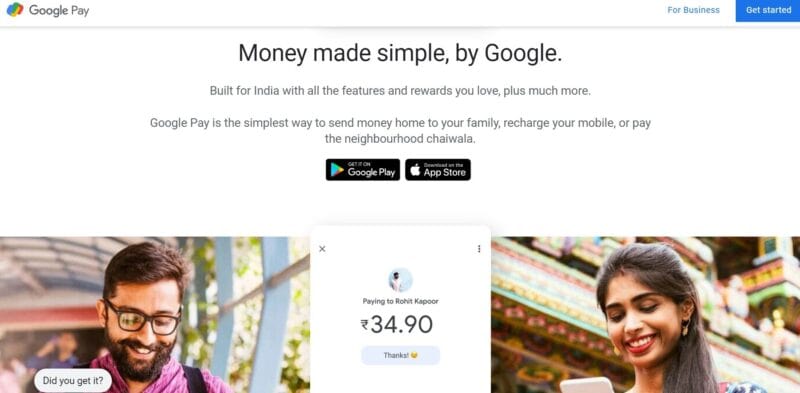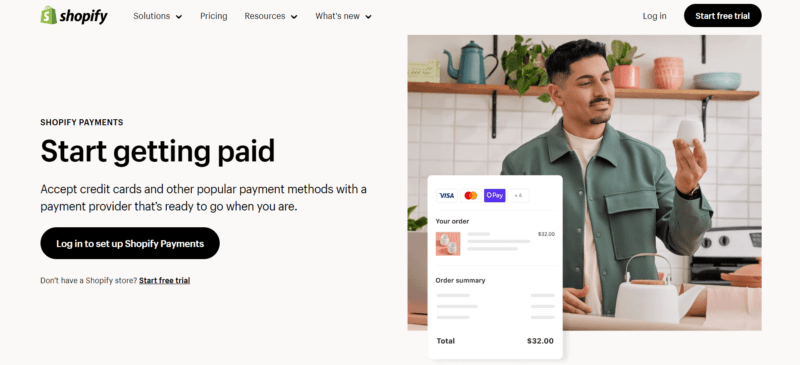In an ever-evolving digital landscape, the need for secure and efficient online payment solutions has become necessary. For individuals as well as businesses, finding the right payment gateway that suits their specific needs is essential. While PayPal has long been a popular choice, it’s always prudent to explore alternative options that offer competitive features, cost-effectiveness, and user-friendly interfaces. In this article, we will explore the best PayPal alternatives in India. Whether for personal or professional use, understanding these options is crucial for making informed decisions in the digital payment sphere.
What is PayPal?
PayPal is an online payment platform that ensures safe and secure transactions for shopping online and transferring money. By connecting your bank account, credit card, or debit card to your PayPal account, you gain the convenience of using PayPal for purchases at various online stores. PayPal acts as a trusted intermediary, safeguarding your payment details while facilitating transactions between your bank and the merchants.
Moreover, PayPal allows you to securely send and receive money from friends and family, making it handy for tasks like sharing rent expenses with roommates or accepting birthday gifts.
Best PayPal Alternatives in India
PayPal is a powerhouse in the world of digital payments, boasting a whopping 360 million active users spread across over 200 countries. Their journey began in 1998, and since then, PayPal has revolutionized online purchases and money transfers, offering consumers flexible alternatives.
Instead of relying solely on credit cards, PayPal allows you to make online payments using your bank account while keeping your payment details secure from merchants. Sending money through PayPal is usually a breeze and often doesn’t cost a dime, rendering traditional checks and expensive wire transfers a thing of the past. Fast forward to today, PayPal remains a top choice for online shopping and hassle-free money transfers.
However, PayPal may not cater to the specific needs or preferences of all users, including businesses and individuals, in terms of fees, accessibility, or localized support. Alternative payment gateways offer competitive rates, flexibility in transaction processes, and localized customer support, addressing gaps that PayPal might have in the Indian market. This promotes healthy competition and empowers users to choose a payment solution that best aligns with their requirements and expectations.
1. Stripe

Stripe Payments is a robust tool for handling online transactions, offering the flexibility to accept a wide range of payment methods and over 135 currencies. This makes it ideal for online retailers catering to an international audience.
For those who primarily conduct in-person transactions, integrating Stripe Terminal can facilitate accepting payments on-site. However, if in-person sales are a significant part of your business, there might be more tailored options available elsewhere. Nevertheless, Stripe stands out for its transparent flat-rate pricing structure without imposing monthly fees, and the freedom to cancel anytime if it doesn’t align with your needs.
One of Stripe’s strengths lies in its open API and advanced developer tools, enabling users to craft a checkout process that feels personalized and fits their specific requirements, provided they have the necessary technical know-how.
Pros:
- Highly adaptable and customizable to suit unique needs.
- Comprehensive reporting tools for in-depth insights.
- Convenient subscription management features.
- Competitive and easy-to-understand pricing.
- Availability of instant payout options.
Cons:
- Main focus is on online merchants.
- Demands a certain level of technical proficiency.
2. Payoneer
Payoneer offers an all-inclusive payment solution, making it easy for freelancers, online sellers, and small to medium-sized businesses to receive funds from customers worldwide quickly, reliably, and at a low cost. It’s a reputable company, regulated by financial authorities in the US, UK, and EU, ensuring trust and security.
With Payoneer, users have access to practical international and local payment options, especially in countries where traditional payment methods might encounter challenges. These include virtual collection accounts in various currencies like USD, EUR, and JPY, as well as free in-network transfers and direct payments through credit cards, eChecks, or via marketplaces and networks. Over 3,500 companies utilize Payoneer’s services for payments.
Compared to popular alternatives like PayPal or Western Union, using Payoneer generally results in significantly lower fees. Freelancers, online sellers, affiliate marketers, and businesses can easily receive funds into their Payoneer account from various payment platforms and conveniently withdraw them to their local bank accounts or via the Payoneer Debit Card (MasterCard).
Pros:
- Regulated by the FCA, ensuring a secure platform.
- Easy to navigate and use, catering to a wide range of users.
- Some payments become available within 2-6 hours, ensuring quick access to funds.
- Low fees and favorable exchange rates compared to alternatives.
- Available in over 200 countries and supports 150 different currencies.
- Multiple payment options, including free transfers between Payoneer accounts.
Cons:
- Application approval may sometimes take longer than desired.
- Virtual local accounts under the Global Payment Service cannot receive charges directly.
- The Payoneer MasterCard incurs annual and withdrawal fees.
3. Wise

Wise, formerly known as TransferWise, is a fintech company that offers a cost-effective solution for sending money from the United States to over 70 countries. They provide some of the most competitive exchange rates in the market. When using Wise, you have flexibility in funding your money transfers, including options like bank accounts or credit cards, although it’s important to note that recipients must have a bank account to receive funds.
Navigating the Wise website is user-friendly. Their homepage features a handy cost calculator that allows you to easily calculate fees and exchange rates. Additionally, their FAQs section is well-organized and provides valuable information. Once you’ve initiated a transfer, Wise guarantees the rates, and you have the option to cancel transfers that haven’t yet been converted or paid.
The setup and login processes are straightforward, offering the convenience of registering with an email address or linking your account with Apple, Google, or Facebook, which sets them apart from other transfer providers. Wise’s mobile apps for both iOS and Android receive high ratings from users.
Pros:
- Wise supports the largest number of currencies for top-up and account holding among all digital banks.
- They are known for delivering an exceptional customer service experience.
- Wise is publicly listed on the London Stock Exchange.
Cons:
- Wise lacks a banking license, which means there’s no deposit guarantee or the ability to set up standing orders.
- There is no free option available for depositing USD into your Wise account.
- You cannot use Wise to make transfers to merchants involved in cryptocurrency, forex, CFDs, and options trading.
4. Remitly
Remitly is an online money transfer service that lets you send funds quickly from the U.S. to over 90 countries, particularly in the Americas. Compared to other options that promise swift delivery, Remitly strikes a good balance between speed and reasonable pricing. Typically, they charge a fixed fee of around $4 for sending money, which can vary based on the destination, amount, and how you pay.
When it comes to exchange rates, Remitly tends to have a markup ranging from a little over 1% to slightly above 3%. The specific markup depends on the currency and how you choose to make the payment, but it’s generally in line with what similar competitors offer.
Pros:
- No or low fees for transfers to select countries.
- Flexibility to receive funds through various methods like bank transfers, mobile devices, cash pickups, or even home delivery.
- Round-the-clock customer service for assistance.
Cons:
- Higher fees apply for transfers to certain countries.
- The fee structure can be a bit complex and hard to decipher.
- Availability of some transfer methods may be limited.
5. Skrill

Skrill, originally known as Moneybookers, has been a major player in the online payment industry since its establishment in 2001. It functions much like PayPal, enabling users to send and receive payments globally. Over the years, Skrill has maintained its position as one of the leading web wallet providers. Skrill offers both a prepaid card and an e-wallet, giving users versatility in managing their finances. The prepaid card is available in GBP, EUR, USD, and PLN currencies. Additionally, users can connect their bank accounts for seamless online transactions.
Making payments through Skrill is convenient, rapid, and secure, with all transaction data stored centrally. When making a purchase, customers simply select Skrill and enter their email address and password. Moreover, transferring funds between their Skrill account and online banking account is straightforward, as is withdrawing money using ATMs.
Pros:
- Skrill is well-suited for working with forex and online gambling accounts, making it a favored choice in these industries.
- It offers the advantage of not having a fixed transfer fee when sending money directly to a bank account, giving users cost-effective options.
- It simplifies money transfers by allowing users to send funds easily to an email address or phone number linked to a bank account, enhancing the user experience.
- Skrill provides a prepaid card powered by MasterCard, enabling users to access their funds conveniently.
- It offers a user-friendly mobile app, ensuring that users can manage their finances on the go.
Cons:
- The initial setup process for the platform can be somewhat cumbersome, potentially causing some users to find it tedious.
- Its fee structure can be intricate, leading to confusion for users who may not fully understand the associated charges.
- When conducting international transfers from one Skrill account to another, users may encounter high currency exchange fees, which could make such transactions less cost-effective.
6. PayU
PayU is a versatile payment gateway that facilitates both online and offline transactions, providing a comprehensive payment solution for businesses and allowing seamless collection of payments from individual clients, encompassing various industry sectors. The platform offers an extensive array of payment options, exceeding 100, including UPI and Wallets, making it convenient for users to choose their preferred mode of payment. Its integration capabilities with websites and external mobile applications make it exceptionally user-friendly for entrepreneurs with online stores, enabling effortless payment collection in just a few minutes without requiring any coding expertise.
PayU is also ideal for startups seeking to collect payments through diverse channels such as WhatsApp, SMS, Email, and Facebook. Moreover, enterprises can utilize PayU to efficiently collect payments from customers worldwide, benefitting from the global reach of the platform and the ability to establish their customized BharatQR for enhancing omnichannel business outreach in real-time.
Pros:
- PayU’s 450+ payment methods simplify the purchasing process for customers worldwide.
- The platform provides robust fraud protection, helping businesses manage and mitigate risks associated with online transactions.
- With operations in over 50 markets and support for multiple currencies, PayU is an excellent choice for businesses with an international customer base.
- PayU seamlessly integrates with popular e-commerce platforms like WooCommerce, Shopify, and Magento, streamlining the payment gateway integration for businesses.
- PayU offers tailored solutions for different industries, ensuring businesses can meet their unique requirements effectively.
Cons:
- PayU’s fee structure can be intricate and challenging to decipher, particularly for businesses operating across multiple markets.
- Some users have reported slower response times from its customer service, potentially causing inconvenience for businesses in need of immediate assistance.
- Certain businesses have experienced longer-than-average wait times for fund settlement, which could be a drawback for those seeking quicker access to their funds.
7. Instamojo

Instamojo, a leading online platform in India, offers an effortless way for small businesses, MSMEs, and startups to set up their own online stores. Their user-friendly interface empowers businesses by providing eCommerce stores and secure online payment solutions. A notable achievement is that Instamojo supports 10% of digitally active MSMEs in India, earning the trust of numerous businesses nationwide.
The platform stands out for its accessibility and robust security measures. Instamojo ensures data safety through 128-bit encryption and compliance with PCT-DSS standards, in alignment with RBI requirements. Business owners benefit from built-in analytics that help track transactions and growth patterns. Instamojo keeps businesses informed with timely alerts and notifications for every transaction, enabling them to concentrate on business growth while ensuring seamless customer payments.
Pros:
- Signing up is free with no setup costs.
- Detailed payment analysis, including received payments, payment trends, and outstanding dues.
- Strong data security with 128-bit encryption and PCT-DSS compliance.
- Versatile payment options, including credit/debit cards, net banking, UPI, and EMI.
- Integration of Instamojo gateway with your website.
Cons:
- No support for digital wallets.
- Potential difficulties in accepting payments above INR 10,000.
- Transaction fees are relatively high compared to competitors.
- Lack of an iOS app for mobile users.
8. Cashfree Payments
Cashfree is a popular online Indian payment gateway that caters to both accepting payments from customers and facilitating payments to vendors. It stands out for its developer-friendly approach, allowing easy integration into websites. Even without a website, Cashfree provides payment links for seamless transactions.
Users should be aware that Cashfree applies charges based on transaction types. However, for businesses with significant transaction volumes, including microtransactions, custom pricing options are available. Interested parties can reach out to the sales department to explore tailored pricing structures. One notable advantage of Cashfree is the absence of setup fees or account maintenance charges for partners, making it an attractive option for freelancers and small to medium-sized businesses, potentially saving on expenses compared to other payment gateways.
Pros:
- Cashfree prioritizes secure transactions with a unique bank account verification service.
- It offers a diverse range of payment options both domestically and internationally.
- Cashfree enables acceptance of payments from customers overseas, presenting the total amount in the preferred currency.
Cons:
- International transactions may incur additional fees and exchange rates per card, potentially increasing the overall cost for either the business or the customer.
- Cashfree follows a settlement time of 2 business days after the transaction is successfully processed.
9. Razorpay

Razorpay stands as a cloud-based solution tailored for midsize and large enterprises, aiming to streamline payment processing through payment gateways and vendor payouts. It serves as a unified platform, allowing managers to efficiently manage finances, generate customized reports, and automate workflows.
This application boasts a range of features, encompassing debit and credit card processing, comprehensive checkout experiences, mobile payment capabilities, recurring billing, online onboarding, robust analytics, and more. Professionals find value in its ability to accept both international and domestic payments while providing online receipt generation. For those seeking its pricing details, these are made available upon request. Support is readily accessible through phone, email, and various online channels.
Pros:
- Integrating payments into websites or apps is made easy with Razorpay, offering simple integration options.
- Users can enhance their online platforms by incorporating a wide array of payment options, ensuring a seamless user experience.
- Razorpay provides the convenience of recurring payments and subscriptions, streamlining financial processes.
- The application focuses on specific business sectors by leveraging data and insights, tailoring its services accordingly.
Cons:
- While offering a variety of payment options, Razorpay may have limitations in international support for transactions.
- In some cases, Razorpay might necessitate longer settlement times or impose heightened scrutiny on certain high-risk enterprises.
- The onboarding process with Razorpay could be challenging and time-consuming for certain organizations, potentially posing a hurdle to their adoption.
10. ProPay
ProPay is an online tool designed to assist businesses in processing credit/debit card and ACH payments using mobile devices. This platform helps organizations streamline financial tracking, biometric verification, electronic signature capture, and invoice management within a unified interface. Professionals using ProPay can easily calculate taxes, manage receipts, and generate tailored reports to meet their specific needs. The application offers features such as transaction monitoring, data synchronization, mobile accessibility, and insightful analytics.
One notable feature of ProPay is its application programming interface (API), enabling seamless integration with various third-party eCommerce platforms and payment gateways. Pricing details are available upon request, and the platform offers customer support through phone, email, and other online channels.
Pros:
- ProPay offers straightforward flat-rate pricing, ensuring businesses can anticipate their costs without hidden fees or surprises.
- Users are not burdened by mandatory monthly minimum transaction requirements, making it accessible for businesses of varying sizes.
- ProPay is particularly well-suited for businesses in the direct selling industry, offering tailored solutions for their unique needs.
- It seamlessly integrates with eCommerce operations, simplifying online payment processing for businesses.
- ProPay enjoys a favorable reputation with few public complaints, indicating customer satisfaction with its services.
Cons:
- Users should be aware that there may be setup fees associated with getting started with ProPay.
- Additionally, there may be annual fees that businesses need to consider when budgeting for this solution.
- For high-volume merchants, ProPay may become expensive, so businesses with substantial transaction volumes should weigh the costs carefully.
11. Google Pay

Google Pay is a convenient and secure digital wallet application that operates in the cloud, offering a smooth payment processing experience for users on their tablets and smartphones. Tailored for Android devices, it allows individuals to link their cards to an NFC-enabled Android device, enabling them to use their mobiles for in-store payments instead of physical credit cards.
Serving as a viable alternative to Google Wallet, Google Pay facilitates purchases within its Android app and covers payments for various Android services like movies and music. To enhance security, it utilizes virtual account numbers instead of revealing actual bank account or card details, providing an added layer of protection during transactions. Moreover, users with smartphones featuring fingerprint readers can authenticate payments using their fingerprints.
Pros:
- Google Pay is compatible with a wide range of devices, making it accessible to a broad user base.
- Setting up and using Google Pay is straightforward, ensuring a hassle-free experience for users.
- The use of virtual account numbers enhances security, safeguarding sensitive financial information.
- Google Pay keeps a detailed record of transactions, simplifying expense tracking and management.
- Users can benefit from promotions and cash-back rewards when making payments through Google Pay, potentially saving money.
Cons:
- Google Pay may not be accepted by all countries and banks, limiting its usability in some regions.
- The application is primarily tailored to Android device users, which may exclude those with different mobile platforms.
- Transfers to and from bank accounts may not always be as speedy as desired, which could inconvenience users in urgent situations.
12. Helcim
Launched in 2006 in Canada, Helcim has evolved into a comprehensive payment processing platform serving businesses in both the United States and Canada. Over the years, it has gained significant popularity as a trusted payment processing solution. Helcim boasts a range of services catering to online and in-person payment processing needs. Its distinctive tiered pricing structure is particularly notable, offering cost advantages to high-volume merchants. With budget-friendly plans and a wealth of useful features, Helcim stands out as a top-notch choice among credit card processing services available today.
Pros:
- Helcim is lauded for its clear and straightforward pricing model, ensuring businesses know exactly what they’re paying for.
- High-volume merchants can benefit from its tiered pricing, which translates into lower costs, making it an attractive option for businesses with substantial transaction volumes.
- Helcim offers seamless inventory management integration, simplifying the tracking and management of stock for businesses.
Cons:
- Helcim may pose challenges when it comes to projecting revenues, potentially making it harder for businesses to plan their financial future effectively.
- The absence of online chat customer support could be seen as a limitation for those who prefer real-time assistance and quick solutions to their queries.
- Helcim maintains a sizable list of restricted business types, which could limit its suitability for certain industries or ventures.
13. Venmo

Venmo is a handy mobile payment app that allows instant sending and receiving of money. Users can easily send funds from their debit cards, credit cards, bank accounts, or Venmo balance. When money is received, it’s added to the Venmo balance, which can later be transferred to a bank account or kept within the Venmo app. One of Venmo’s key features is its ability to split bills and expenses among multiple people, making it convenient for shared payments. Whether it’s splitting rent with a roommate or dividing a restaurant bill among friends, Venmo facilitates seamless transactions.
Beyond basic money transfers, Venmo incorporates a social aspect. Users can connect with friends on the platform, and a transaction feed displays payments made and received. Each payment can include notes, emojis, or animated stickers for a personalized touch. Venmo also offers privacy settings, allowing users to control who sees their transactions, adding a layer of security.
Pros:
- Swift and hassle-free person-to-person payments.
- Free to send money using a bank account or debit card.
- Reasonable fees for credit card payments.
- Accepted as a payment method at select businesses.
- Provides options such as a debit card, teen debit card, and credit card.
- Infuses a social element into the money transfer experience.
Cons:
- Default setting makes payments public.
- Inability to cancel payments once sent.
- Not suitable for international transactions.
- Attracts some fraudulent activity from scammers.
Also Read: Cash App vs Venmo vs Zelle: Which is the best?
14. 2Checkout
2Checkout is well-known for its expertise in streamlining the inner workings of businesses. They excel at offering comprehensive payment processing solutions, making online, mobile, and offline transactions smooth and secure. One of their strengths is the diverse array of payment methods they support, including major credit cards, debit cards, PayPal, and more, spanning over 45 global currencies. This makes them a preferred choice for a wide-ranging international clientele.
What sets 2Checkout apart is their seamless integration with numerous global marketplaces and popular cart solutions. This integration capability is a significant benefit for businesses, enhancing their reach and accessibility. Moreover, they prioritize security through advanced fraud protection measures and flexible checkout options, allowing businesses to create a secure and user-friendly buying experience.
Pros:
- They can accept payments from all around the world in over 45 currencies, expanding business reach internationally.
- It smoothly integrates with over 120 global marketplaces and cart solutions, fitting various business models.
- Their advanced fraud detection system enhances security and safeguards both businesses and customers.
- Businesses benefit from effective subscription management tools like recurring billing and revenue recovery.
- Detailed insights and reports are provided, aiding businesses in data-driven decision-making.
- They offer 24/7 customer support through email, live chat, and phone.
Cons:
- Transaction fees are relatively high compared to some competitors, potentially affecting smaller businesses.
- Payouts can be delayed up to two weeks, impacting the cash flow of certain businesses.
- Some businesses have experienced account suspension due to stringent security measures.
- The pricing structure can be confusing, with varied charges for different features and payment types.
- Customization options for checkout forms are limited compared to some competitors.
15. Coinbase Commerce

Coinbase Commerce stands as a seamless payment processing platform that aids businesses in accepting payments through a range of cryptocurrencies. This decentralized, peer-to-peer solution allows users to send and receive payments between wallets, accessible to merchants and Coinbase exclusively.
Merchants utilizing Coinbase Commerce have the flexibility to accept payments in notable cryptocurrencies like Bitcoin, Bitcoin Cash, DAI, Litecoin, USD Coin, and Ethereum. To manage these transactions, teams can utilize a seed phrase, a set of 12 words, granting access to the received cryptocurrencies and enabling the signing of blockchain transactions. The added cloud backup feature permits safekeeping of seed phrases in a Google account. Furthermore, merchants can opt to receive webhook notifications each time a payment transaction is completed.
Pros:
- Coinbase Commerce offers a simple and approachable design, ensuring an intuitive experience.
- The platform is easy to set up, making it accessible for both novices and experts.
- Users can access Coinbase Commerce through a web version or a mobile app, enhancing convenience.
- The platform facilitates fast and efficient tracking of payments, promoting transparency.
- Coinbase Commerce does not impose hidden charges or termination fees, fostering trust among users.
- Merchants can personalize the checkout process and embed payment buttons, tailoring the platform to their needs.
Cons:
- Coinbase Commerce offers fewer cryptocurrency options compared to some other platforms.
- Users have reported less-than-satisfactory customer service experiences.
- Some features of Coinbase Commerce may be geographically limited, potentially limiting accessibility for certain users.
16. PingPong
PingPong, a global payments company, assists e-commerce sellers and freelancers in receiving payments seamlessly. Whether from clients or popular platforms like Amazon, it offers a reliable means to get paid. They extend their services globally, including a convenient money transfer option for users in the United States.
Founded in Hangzhou, China, PingPong has been actively engaging with Indian users through its liaison office in Bengaluru since 2019. For Indian users, it ensures that international payments are received and converted into Indian Rupees before being deposited into their local bank accounts. The platform accepts payments in various major currencies, including US Dollars, Euros, British Pounds, Canadian Dollars, Japanese Yen, and Australian Dollars. This flexibility allows users to receive payments in these currencies, with the funds then converted to Indian Rupees for deposit.
Pros:
- Users appreciate the lack of a maximum limit on transactions, providing significant convenience.
- The platform boasts the lowest transaction fees, adding to its appeal.
- Exchange rates are based on midmarket rates, which is beneficial for global enterprises.
- The user-friendly interface enhances the overall experience.
Cons:
- The limited availability of eight currency options may pose a challenge for certain businesses.
- Customer support is currently lacking, impacting the overall service experience.
- Being a newer company compared to established platforms like Payoneer and PayPal, it may not yet have widespread recognition in the market.
17. Amazon Pay

Amazon Pay is a seamless payment option designed to enhance the checkout process for businesses, allowing customers to utilize their saved Amazon account information. Regardless of a business’s size, type, or target audience, integrating this payment solution can significantly streamline the checkout experience, leveraging the familiarity and trust associated with Amazon.
With Amazon Pay, customers can complete purchases with just a few clicks, drawing from the vast pool of Amazon users. This payment method capitalizes on the extensive Amazon customer base, ensuring potential customers can easily finalize transactions using their existing Amazon account data. Essentially, anyone who has made a purchase on Amazon already possesses an Amazon Pay account. By incorporating the platform, businesses can tap into the influence of the brand and reach a broad global audience of potential customers.
The fast and secure nature of this payment method enhances the overall user journey, resulting in a more gratifying experience for both the business and its customers. Amazon Pay effectively addresses common pain points experienced by customers during online purchases, such as lengthy forms, excessive information requests, and security concerns. By simplifying the process, it reduces cart abandonment rates, leading to increased successful transactions.
Pros:
- Effortless checkout process for customers using Amazon accounts.
- Accommodates a diverse customer base with global reach and multi-currency support.
- No initial setup or monthly fees, paying only per transaction.
- Integration with Alexa voice technology for convenient order placement and tracking.
Cons:
- Reserve policy may cause delays in payouts, particularly for newer accounts.
- Lacks support for in-person payments.
- Absence of volume discounts or personalized package options.
18. CoinGate
Many customers find CoinGate to be their preferred payment processor due to its user-friendly account management system, the ability to make fiat payments directly to bank accounts, and the recent addition of convenient email billing features. It offers not only merchant services but also a versatile platform allowing users to buy and sell multiple crypto-assets using a single payment method. It’s been praised as a one-stop solution, serving as a crypto payment processor, a trading platform, and a gift card retailer.
With a variety of options available, CoinGate brings cryptocurrencies closer to widespread adoption by providing different avenues for setting up crypto payments for both online and physical businesses. This includes payment buttons, web-based Point-of-Sale applications, API integration, and official plugins for major e-commerce platforms. Customers using the platform enjoy the flexibility of making purchases using credit/debit cards, SEPA bank transfers, or mobile balances. Furthermore, they can easily convert their coins to fiat currency, enabling every CoinGate merchant to accept a vast range of over 70 cryptocurrencies.
Pros:
- CoinGate supports over 100 countries and 50 currencies for merchants, making it unique in its services.
- The platform prioritizes security through features like two-factor authentication and cold storage.
- Users benefit from 24/7 customer support accessible via email or support requests.
- A generous referral program rewards users with 1% for each buy or sell made by their referrals.
- The platform caters to both individual crypto traders and businesses with different integration options.
Cons:
- CoinGate does not support cryptocurrency deposits on their platform.
- The platform is limited to supporting only English and Spanish languages, with the possibility of requesting additional languages.
- CoinGate does not offer a dedicated CoinGate wallet for users.
19. Shopify Payments

Shopify Payments stands out as an integrated payment solution that swiftly enables businesses to accept payments right after their initial setup. This service eliminates the need for third-party payment processors and comes included with all subscription plans.
One of the notable advantages of Shopify Payments is its versatility in offering various payment methods and competitive processing rates. This makes it an attractive choice for enterprises leveraging Shopify as their e-commerce platform or point-of-sale system. However, it’s crucial to note that this payment service isn’t universally accessible, with restrictions in place for businesses in certain high-risk industries and specific countries.
Shopify Payments simplifies the payment acceptance process for businesses through their Shopify online stores. Thanks to its seamless integration, entrepreneurs can start receiving payments the moment their store goes live. This integration not only provides customers with a smooth checkout experience but also allows businesses to conveniently manage their payment and sales data within the Shopify ecosystem.
Pros:
- Shopify Payments offers straightforward, predictable pricing, which simplifies financial planning for businesses.
- Unlike some providers, Shopify Payments doesn’t impose early termination fees, offering flexibility to users.
- It serves as an all-in-one payment platform, streamlining the payment process for businesses.
- Shopify Payments is particularly well-suited for e-commerce ventures, enhancing their payment capabilities.
- The service enables businesses to accept payments in multiple currencies, expanding their reach.
Cons:
- Users should be aware that sudden account terminations are a possibility, necessitating caution and compliance.
- Funding holds can be a common occurrence, potentially impacting cash flow for businesses.
20. WePay
WePay functions as a payment service provider (PSP), collaborating with independent software vendors and platforms. This partnership enables seamless integration of WePay’s payment platform into websites through their application programming interface (API), allowing customers to complete purchases without redirection during checkout.
WePay offers three distinct products: Clear, Link, and Core. However, to avail a WePay account, one must register through a payment platform partner like TouchBistro, FreshBooks, Eventzilla, TeamSnap, Buildertrend, Constant Contact, Ecwid, SchoolAuction, Keap, Classy, or Webconnex. For small businesses not utilizing these partner companies, alternative payment options might be more suitable.
Pros:
- Convenient for small businesses collaborating with WePay partners.
- Customization options available.
- No upfront setup charges or recurring monthly fees.
Cons:
- Absence of phone support for technical inquiries.
- Designed primarily for small businesses associated with WePay platform partners.
- Potential for elevated processing costs depending on the utilized platform.
Also Read: All About PayPal Credit Requirement
India offers a diverse array of alternative payment platforms, each with distinct features catering to various user needs. These alternatives provide reliable and secure options for digital transactions, promoting a cashless economy. Users can choose based on preferences, accessibility, and integration with their financial activities.




